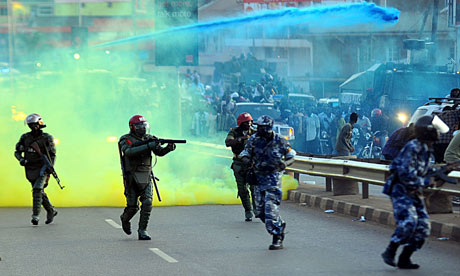
Ugandan anti-riot personnel fire teargas to disperse supporters of opposition leader Kizza Besigye in Kampala. Photograph: Tony Karumba/AFP/Getty Images
Uganda's president has branded the BBC and other media organisations as "enemies" because of their coverage of recent anti-government protests.
Yoweri Museveni blamed "drug users" for the month-long demonstrations, the biggest civil unrest in sub-Saharan Africa this year, and pledged to "end this criminality".
In a statement published in the state-owned New Vision newspaper, Museveni warned: "The media houses, both local and international, such as al-Jazeera, BBC, NTV, The Daily Monitor, etc, that cheer on these irresponsible people, are enemies of Uganda's recovery and they will have to be treated as such. Why do they not also report the negative acts of these elements?"Kabakumba Masiko, the Ugandan information minister, said laws would be amended to deal with any journalist who became an "enemy of the state". She told the BBC's Network Africa programme: "If you look at the way these media houses have been reporting what has been going on in our country, you realise they were inciting people and trying to show that Uganda is now ungovernable, is under fire as if the state is about to collapse."
There have been signs that Uganda's government feels increasingly threatened by the media. At least 10 journalists were assaulted by soldiers while covering the return to Uganda last week of the opposition leader, Kizza Besigye, according to Reporters without Borders. Journalists have imposed a news blackout on the government in response to what they describe as rising brutality against those covering the demonstrations.
In a press briefing following riots on 29 April, the internal affairs minister, Kirunda Kivejinja, accused foreign journalists of being "in bed" with Besigye.In April, the government ordered internet service providers to block Facebook and Twitter, where the walk-to-work protest movement had gathered steam, but the companies refused.
A BBC World Service spokesman said: "We are aware of the comments and will continue to report events in Uganda according to BBC editorial guidelines on impartiality, accuracy and fairness."Rosebell Kagumire, a journalist in Kampala, said : "The threat to media has been here since the walk-to-work campaign was met with violence. The government warned TV and radio stations in Uganda about broadcasting messages or events that would promote ethnic prejudice and civil disorder, then banned live coverage. Journalists have in the past month received threats and been trailed by security operatives over pictures, or reports they filed."
The demonstrations over high fuel and food prices have been crushed by security forces firing teargas and live rounds. At least nine unarmed people were shot dead by police, Human Rights Watch says.
In his public letter, Museveni accused Besigye and other opposition leaders of using the protests to create chaos. "Coming to the walk-to-work issue, it is the same hidden agenda of Besigye and his groups. They want to ignite riots using drug users or even hired groups to loot the property of the [civilians]. Weaknesses in the existing laws, too much laxity by elements of the judiciary and the police, allow all this indiscipline and criminality to persist."
The protests started slowly but were boosted three weeks ago when police arrested Besigye for the fourth time, dousing him with pepper-spray at point-blank range before hauling him on to a truck.
Museveni, who took power in 1986, accused Besigye of leading a "criminal circus" when he returned from Kenya after getting medical treatment for injuries received during his arrest. "This will not continue. We are seeking for everybody's understanding as we end this criminality using all the angles of the law."
The president, meanwhile, apologised to foreign leaders whose vehicles were targeted by stone throwers as they drove through Kampala during last week's presidential inauguration, which coincided with Besigye's return. Museveni said the vehicle of Nigeria's president, Goodluck Jonathan, was hit by a stone, and that the car carrying the Congolese leader, Joseph Kabila, was almost hit. He apologised to the politicians for the "hooliganism and irresponsibility".
Source: The Guardian,
No comments:
Post a Comment